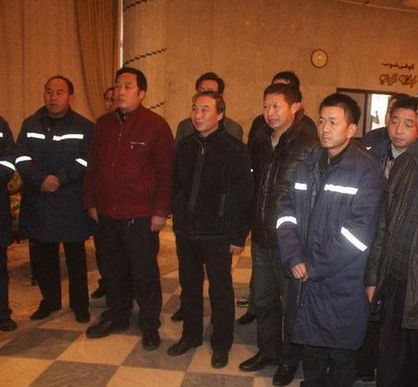
Kidnappings Highlight Weakness in Chinese Security Posture Abroad
Publication: China Brief Volume: 12 Issue: 3
By:

In the space of 24 hours starting January 31, disgruntled Egyptians in the Sinai Peninsula kidnapped and then released 25 Chinese factory workers in an effort to get Cairo to pay attention to the chaotic situation on the peninsula (China News Service, February 1). The news came hard on the heels of the abduction in Sudan of 29 Chinese construction workers, who were working in the restive South Kordofon region for China’s Power Construction Corporation (CPCC). Beijing promptly dispatched a Ministry of Foreign Affairs team with representatives from the State-owned Assets Supervision and Administrative Commission to liaise with Khartoum and the CPCC emergency working group as well as to monitor the situation (Xinhua, January 31; January 30; Global Times, January 30). While not as a dramatic as the whirlwind diplomacy that led to coordinated patrols of the Mekong River last fall, Beijing is showing greater capacity to react to international events that threaten China’s interests—yet not necessarily at anticipating them.
In the last few years, Chinese workers have been kidnapped and/or murdered in at least eleven different countries: Cameroon, Colombia, Egypt, Iraq, Niger, Nigeria, Pakistan Philippines, Sudan, Thailand and Yemen. While oil workers have been the most common targets—especially in Sudan where China has an estimated 10,000 workers—telecommunications engineers, fishermen, construction and factory workers have all been targets of rebels, terrorists and criminal or disgruntled citizens (The Economist, January 21). While the evacuation of Chinese citizens from Libya shows Beijing can take action quickly in emergency situations, thousands of Chinese businesspeople and workers are exposed on a day-to-day basis. Usually these incidents are relatively small, involving two to four Chinese, and do not seem to attract much attention. Lately, however, the numbers affected—13 in Thailand in October, 29 in Sudan and 25 in Egypt—have attracted attention (China Daily, February 1; Xinhua, January 30; Guangming Daily, October 10, 2011).
Part of the problem seems to be the operating assumptions of Chinese businesses and their lack of indigenous (or contracted) security personnel for protection and risk assessment. Chinese MFA officials privately have complained about the activities of Chinese businessmen—even from state-owned enterprises—because they do not inform MFA about their activities but expect Beijing to intervene on their behalf when things go wrong. The sentiment was echoed by Zhu Feng, Deputy Director of the Center for International and Strategic Studies at Beijing University, who wrote that because most Chinese companies overseas are “operating on the assumption that the government will back them—or bail them out if they fail—they can afford to be cavalier” (FirstPost, November 1, 2011).
The well-being of Chinese workers operating overseas is not a new or unrecognized problem. Writing about the risks of China’s growing commercial commitments in Venezuela, Evan Ellis of the U.S. National Defense University noted China has few private security firms capable of operating abroad and less experience with integrating locally-hired security personnel into their operations (“China’s Cautious Economic and Strategic Gamble in Venezuela,” China Brief, September 30, 2011). He Wenping, deputy director of West Asian and African Studies at the Chinese Academy of Social Sciences, echoed this sentiment, saying “Chinese companies rely too much on the protection of host nations while lacking up-to-date risk analysis and response mechanisms.” He added, besides increasing alertness, “it’s time for companies to consider inviting private security companies to guarantee the safety of their overseas investments” (Global Times, January 30).
Beijing claimed in 2007 it would do more to protect Chinese workers abroad after a series of kidnappings and murders demonstrated the risks accompanying its international economic expansion (Reuters, May 9, 2008). Contrary to these claims, however, it is not clear how much the Chinese government has actually done. State Councilor and Minister of Public Security Meng Jianzhu has stayed relatively close to home, traveling and meeting with security officials from countries on China’s periphery. His one trip further afield since this time was to Saudi Arabia and the United Arab Emirates, where he discussed combating crime and international terrorism (Ministry of Public Security, October 11, 2010; October 10, 2010). Based on Chinese press reports, Meng has only met with security officials from two of the eleven countries, Pakistan and Thailand, where Chinese workers have been threatened. Even Meng’s meetings with the Thais, however, were part of the emergency response to the killing of 13 Chinese sailors on the Mekong River rather than an effort to ensure the safety of Chinese workers before something happened (“Mekong Murders Spur Beijing to Push New Security Cooperation,” China Brief, November 11, 2011).
Despite Meng’s leading role in recent security negotiations, the Ministry of Public Security (MPS) arguably is not the right ministry to be involved in protecting Chinese business interests overseas if Beijing chooses to involve Chinese government resources. According to the State Security Law, public security covers domestic threats with domestic origins. Interestingly, China’s civilian intelligence and counterintelligence service, the Ministry of State Security (MSS), appears not to have been tapped, despite its internal role of providing security and counterintelligence support to state-owned firms inside China (Caijing, July 24, 2009; Xinhua, July 9, 2009). This may suggest the restrictions on the MSS presence overseas in official missions remain in place from the 1980s, when the MFA persuaded Deng Xiaoping and other Chinese leaders to remove or restrict the number of MSS officers serving in foreign missions [1]. With more Chinese interests under threat further afield than ever before, it can be speculated reasonably that Chinese intelligence may have the opportunity to expand overseas to assist Beijing in assessing the risks for Chinese citizens and business interests as well as warning leaders about these threats.
Notes:
- Lu Ning, “The Central Leadership, Supraministry Coordinating Bodies, State Council Ministries, and Party Departments,” in The Making of Chinese Foreign and Security Policy in the Era of Reform 1978-2000, ed. David Lampton, Stanford, CA: Stanford University Press, 2001, pp. 50, 414.





